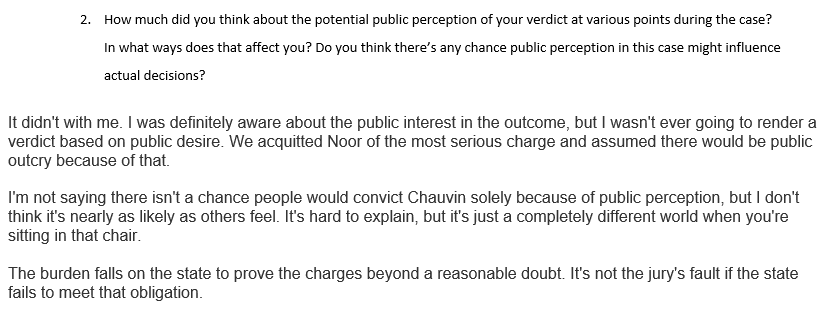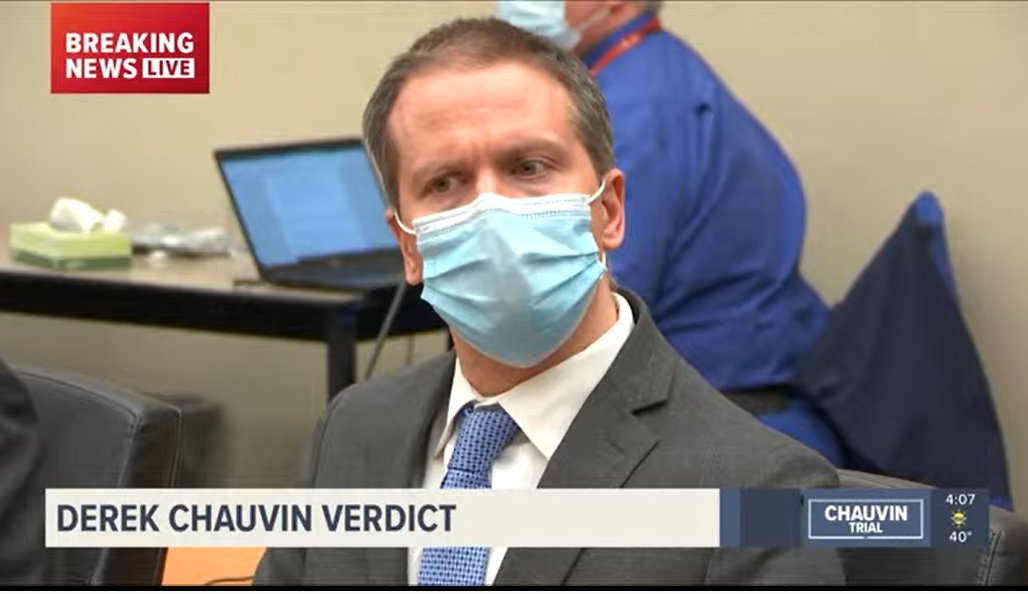
Good morning. We are on verdict-watch in the Derek Chauvin trial. The jury deliberated last night for about 4 hours, from 4p-8p. And they resumed this morning at 8a.
What should we watch for? Besides coming forward with a verdict, at some point they might have a question.
What should we watch for? Besides coming forward with a verdict, at some point they might have a question.
If the jury has a question in this case -- the judge will call the parties back into court and will read the jury's question out loud - and on camera.
The judge will then answer the jury's question on the record (although he will have already discussed his answer with attorneys)
The judge will then answer the jury's question on the record (although he will have already discussed his answer with attorneys)
Questions can be somewhat mundane -- like asking to be refreshed on what someone testified about -- or a question about the exhibits. Here is an example jury question from the Yanez trial in 2017.
https://twitter.com/LouRaguse/status/875739148686151681?s=20
But then -- sometimes a jury question can reveal how deliberations are going.
Check out this note -- also from the Yanez jury in 2017 -- two days before their unanimous verdict was reached.
Check out this note -- also from the Yanez jury in 2017 -- two days before their unanimous verdict was reached.

In the case of this specific note from the Yanez jury -- the judge did *not* read it aloud in court (although the attorneys all knew what it said) and the note was sealed until the verdict.
How to predict how long deliberations could take? It's a fool's errand. If the jury is basically on the same page -- it could happen today. Or if they come to it late in the day, they might wait until tomorrow.
But we have no way to know if they started on the same page.
But we have no way to know if they started on the same page.
If there is no verdict by tomorrow then they no doubt were not on the same page when they started. Being sequestered makes it go faster than if they were not sequestered.
The Noor jury spent just one night in the hotel. The Yanez jury was not sequestered and took til Friday.
The Noor jury spent just one night in the hotel. The Yanez jury was not sequestered and took til Friday.
Even if they start on the same page -- why might it take a long time? The elements and definitions are a lot for some people to wrap their heads around. Take a read for yourself:
mncourts.gov/mncourtsgov/me…
mncourts.gov/mncourtsgov/me…
Remember -- both guilty verdicts and not-guilty verdicts require unanimous decision by the 12 jurors.
A "hung" jury means they can't come to unanimous decision one way or another but we will have lots of warnings through Jury Questions if headed that direction.
A "hung" jury means they can't come to unanimous decision one way or another but we will have lots of warnings through Jury Questions if headed that direction.
Since the Noor verdict in 2019, I've stayed in touch with a juror from that case. I interviewed him over the phone the night of the verdict with specifics on how they decided that case. It's an interesting read.
kare11.com/article/news/l…
kare11.com/article/news/l…
Then the other day, @jurordeux answered some more questions about the deliberation process, which can be enlightening when thinking about what's going on right now with the Chauvin jury.
For starters, he was unmoved by closing arguments.
For starters, he was unmoved by closing arguments.

He confirmed the crime elements make the deliberation process more complicated than you might imagine. 

The Noor jury was expecting backlash over failing to convict on the most serious charge in that case. 

And here is my final question and perhaps the most helpful in envisioning what might be going on right now with the Chauvin jury. 

I thought of another question for @jurordeux about their experience in the Noor case. How did they select a foreperson? What kind of role did that person take? How important might it be for the Chauvin jury? 

It is far too early to think about mistrial in the Chauvin case, but there is another case here in the Twin Cities that shows how that scenario can play out. Anthony
Trifiletti shot and killed a black man who crashed into his vehicle on I-94.
kare11.com/article/news/c…
Trifiletti shot and killed a black man who crashed into his vehicle on I-94.
kare11.com/article/news/c…
Trifiletti and the other man, Douglas Lewis, exchanged words and Trifiletti shot him. Ramsey County prosecutors charged Trifiletti with 2nd degree intentional murder. A jury trial in March (just as jury selection in Chauvin case was beginning) ended in a hung jury.
The prosecution however decided to immediately retry the case. They picked a new jury and a new trial was held -- this time with two charges: 2nd degree intentional and 2nd degree unintentional murder.
The second charge was similar to what Chauvin faces, but instead of 3rd degree assault as the underlying felony, prosecutors chose 2nd degree assault (with a dangerous weapon.) The jury acquitted on the intentional but convicted on the unintentional.
Now Trifiletti is looking at a sentence of about 12.5 years under the Minnesota sentencing guidelines.
A clarification on how jury questions will be handled in the Chauvin case. The judge will read the question on camera in the courtroom in front of pool reporters (and we will break into normal programming to air it when it happens) however the attorneys and jury will be on zoom.
This was a fast verdict. The jury deliberated from 4p-8p yesterday and started this morning again at 8a. So that's about 10 hours total -- which is not a long time for a case like this.
Watch here:
or on KARE 11 in Minneapolis
or on KARE 11 in Minneapolis
We await the verdict potentially in the next few minutes... Chauvin is in the courtroom with his attorney. Cameras are not pulled out yet. We will take you to court as soon as there is "movement."
We are five minutes before 4... still no movement in the courtroom. Expecting go-time any moment now.
GUILTY MURDER 2
GUILTY MURDER 3
GUILTY MANSLAUGHTER 2
• • •
Missing some Tweet in this thread? You can try to
force a refresh










